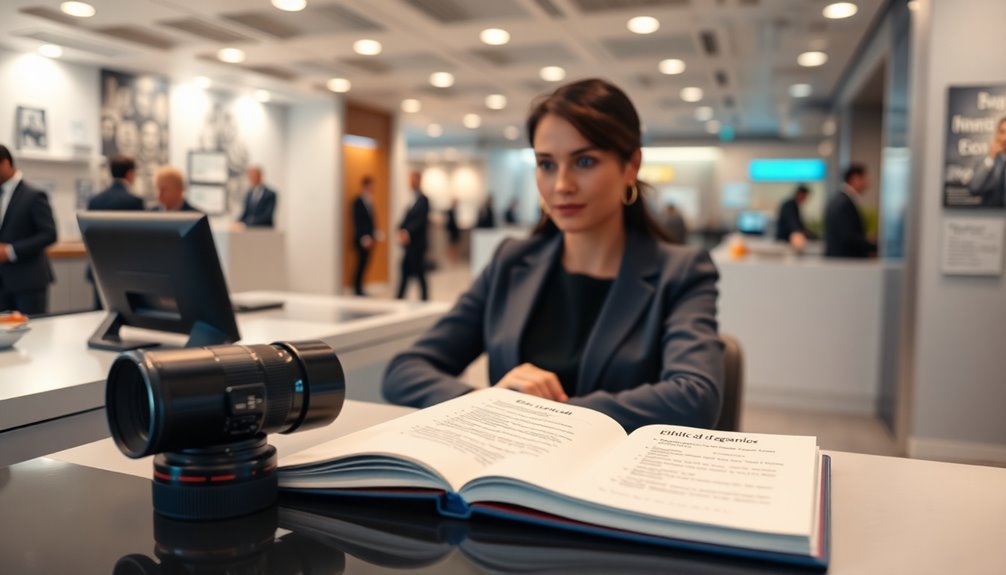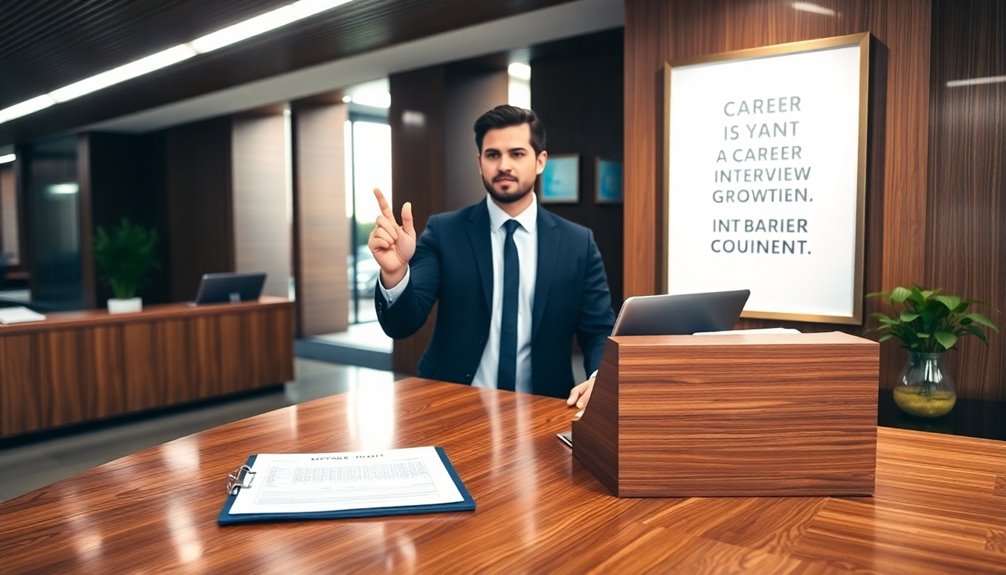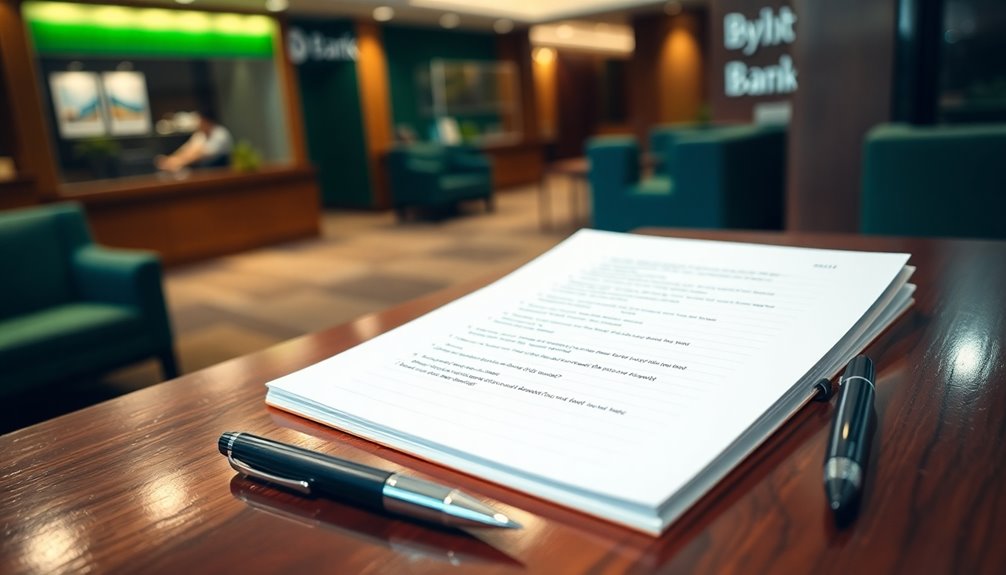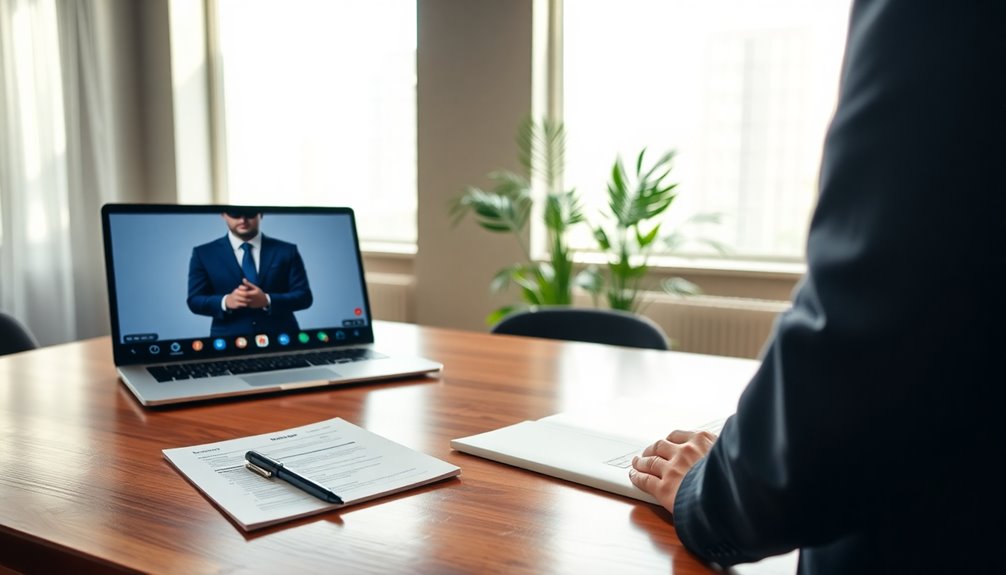When prepping for a bank teller interview, expect essential questions focused on your customer service skills and ability to handle stress. You might be asked about your approach to an upset customer or how you manage multiple tasks under pressure. Be ready to discuss your banking experience, ethical considerations, and your skills in cash handling. Highlight your problem-solving abilities and commitment to maintaining trust. It's also wise to show your familiarity with the bank's services. By understanding these key areas, you'll set yourself up for success and discover valuable insights along the way.
Key Takeaways
- Discuss your relevant banking experience and how it shapes your customer service approach.
- Highlight your conflict resolution skills through specific examples from previous roles.
- Illustrate your knowledge of banking products and services to demonstrate your expertise.
- Share strategies for handling pressure and maintaining professionalism during busy times.
- Emphasize the importance of ethics and trust in building customer relationships in banking.
General Interview Questions

When preparing for a bank teller interview, you'll likely encounter general questions that assess your background and motivations.
You'll need to share details about your personal history, including any relevant experiences that shaped your interest in banking.
Expect to discuss what motivates you to pursue a bank teller position—emphasizing your desire for customer interaction and financial service.
Familiarizing yourself with the bank's services and reputation is vital, as interviewers may ask about your knowledge of their offerings.
Additionally, be ready to reflect on your strengths and weaknesses related to the role.
Previous employers' perceptions of your work ethic might also come up, so think about how you've demonstrated reliability and dedication in past jobs.
Customer Service Scenarios

In customer service scenarios, you'll often face diverse situations that test your ability to connect with clients effectively.
You might encounter a frustrated customer who's waiting too long or someone unsure about their banking options. Your goal is to remain calm, listen actively, and empathize with their concerns.
Ask open-ended questions to gather more information, showing genuine interest in resolving their issues.
You'll need to find solutions quickly, whether it's expediting a transaction or clarifying account information.
Remember to maintain a positive attitude and reassure them that you're there to help.
Experience and Skills

Experience and skills play an essential role in shaping your effectiveness as a bank teller. Your background in customer service, cash handling, and problem-solving can directly impact your performance.
Here are some key areas to focus on during your interview preparation:
- Customer Interaction: Showcase your ability to engage and communicate effectively with clients.
- Cash Handling Expertise: Highlight your experience managing cash transactions and detecting counterfeit money.
- Conflict Resolution: Discuss specific instances where you successfully handled difficult customer interactions.
- Banking Knowledge: Familiarize yourself with various banking products and services to demonstrate your expertise.
Ethical Considerations

Ethical considerations are essential in the banking industry, where trust and integrity form the foundation of customer relationships.
As a bank teller, you'll face situations that test your ethical judgment. It's vital to maintain confidentiality regarding customers' financial information and transactions. You should always act in the best interest of your clients while adhering to the bank's policies.
When confronted with ethical dilemmas, like witnessing a colleague's misconduct, you must address the issue promptly and appropriately. Your ability to navigate these challenges will reflect your commitment to the bank's values.
Demonstrating strong ethical standards not only builds trust with customers but also enhances the overall reputation of the institution.
Performance Under Pressure

Often, bank tellers face high-pressure situations that require quick thinking and calmness. During interviews, you might encounter questions that assess your ability to manage stress effectively. Demonstrating your skills in this area is essential for success.
Here are some key points to take into account:
- Stay composed: Show that you can maintain professionalism under stress.
- Prioritize tasks: Explain how you focus on urgent matters while managing multiple responsibilities.
- Effective communication: Highlight your ability to communicate clearly with customers and colleagues, even when time is tight.
- Problem-solving: Share examples of how you've quickly analyzed situations to find effective solutions.
Organizational Abilities

Organizational skills are essential for success as a bank teller, where juggling multiple tasks is the norm. You'll need to manage your time effectively and prioritize tasks, especially during busy periods. Utilizing technology can help streamline your workflow, allowing you to handle customer inquiries efficiently. Here's a quick overview of key organizational strategies:
| Strategy | Description | Benefit |
|---|---|---|
| Time Management | Scheduling tasks and deadlines | Reduces stress and enhances focus |
| Prioritizing Tasks | Identifying urgent vs. routine tasks | Guarantees critical needs are met |
| Using Technology | Employing banking software and tools | Increases efficiency and accuracy |
| Multi-tasking | Handling several customers at once | Improves customer satisfaction |
Career Development Aspirations

As you develop your organizational skills, it's important to keep an eye on your career development aspirations. Setting clear goals will guide your growth within the banking industry.
Consider these key aspirations:
- Long-term career goals: Define where you see yourself in five or ten years.
- Skill development: Commit to enhancing your competencies through training and education.
- Advancement opportunities: Explore potential promotions within the bank and how to achieve them.
- Alignment with bank values: Verify your personal goals resonate with the bank's mission and practices.
Stress Management Techniques

Managing stress effectively is essential for maintaining your performance as a bank teller. You can use various techniques to keep your stress levels in check. Prioritizing self-care, taking breaks, and practicing mindfulness can greatly improve your focus and resilience. Here's a quick overview of helpful stress management techniques:
| Technique | Description |
|---|---|
| Deep Breathing | Helps calm your mind and reduce anxiety. |
| Time Management | Prioritizes tasks to avoid feeling overwhelmed. |
| Seeking Support | Encourages collaboration and emotional support from colleagues. |
Incorporating these strategies into your daily routine can create a more positive work environment, allowing you to handle customer interactions more effectively and maintain your composure under pressure.
Frequently Asked Questions
How Do You Handle Sensitive Customer Information Securely?
When you handle sensitive customer information, you prioritize security above all.
You guarantee that all data is stored securely and only accessible to authorized personnel. You use encryption for digital communications and never discuss personal information in public spaces.
Regularly, you stay updated on privacy regulations and follow your bank's protocols.
What Methods Do You Use for Verifying Customer Identities?
When verifying customer identities, you'd start by checking valid identification, like a driver's license or passport.
You'd also ask security questions based on their account information to guarantee they're the rightful owner.
If needed, you might use biometric methods, like fingerprints or facial recognition, to enhance security.
Keeping a friendly demeanor while performing these checks helps build trust and reassures customers that their information is safe and secure.
Describe Your Experience With Banking Software or Technology
You've likely worked with various banking software, enhancing your efficiency in managing transactions and customer accounts.
You understand how to navigate systems for account management and transaction processing, ensuring accuracy and speed.
You've also adapted to new technology quickly, staying updated on software updates and features.
Your experience with tools like CRM systems and digital payment platforms has equipped you to provide excellent service while maintaining data security and compliance.
How Would You Introduce New Bank Products to Customers?
When introducing new bank products to customers, you'll want to first understand their needs and preferences.
Start by explaining the product's benefits clearly, addressing how it can enhance their banking experience. Use simple language to avoid confusion and encourage questions.
Share any promotional offers to pique their interest.
Finally, follow up with a personal touch, like checking in later to see if they've any further inquiries about the product.
What Steps Do You Take to Ensure Compliance With Banking Regulations?
To guarantee compliance with banking regulations, you first stay updated on the latest laws and guidelines relevant to your role.
You regularly review internal policies and participate in training sessions.
When handling transactions, you double-check documentation and verify customer identities.
You also communicate openly with colleagues about compliance issues, fostering a culture of accountability.
If you ever spot potential violations, you report them immediately to maintain the integrity of the bank.
Conclusion
To sum up, preparing for your bank teller interview can really be your ticket to success. By understanding the essential questions and showcasing your skills, you'll stand out from the competition. Remember, it's not just about answering questions; it's about demonstrating your ability to connect with customers and handle challenges with ease. So, take the bull by the horns, practice your responses, and step into that interview with confidence. You're one step closer to landing the job!
Eugene brings a fresh, dynamic voice to our platform as one of our talented Writers. Specializing in research-driven content, he explores the latest findings in psychology and personal growth, translating them into actionable insights for our readers. Eugene’s work is fueled by a curiosity about what makes us tick and a desire to help others unlock their potential.










